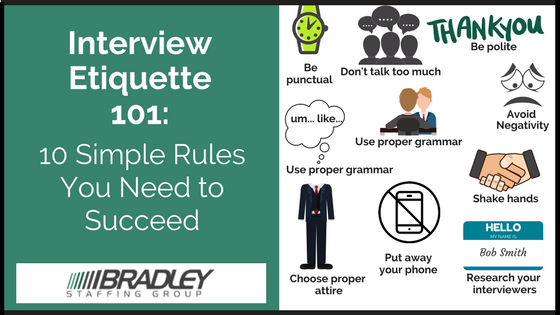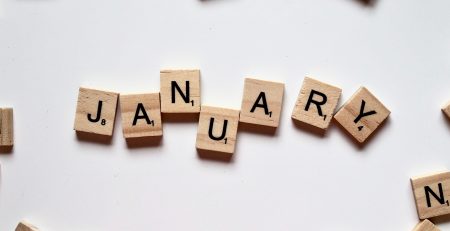Interview Etiquette 101: 10 Simple Rules You Need to Succeed
Use the 10 Minute Rule
The anxiety that comes with being down to the wire for interviews and appointments can detract from your performance. Rushing in at the last minute can unintentionally create the impression that you are disorganized, and unable to plan and prioritize accordingly. Being too early can be awkward in a smaller office environment. You may run into the candidate who interviewed before you, which may throw you off your game. We recommend to our candidates that they plan to arrive about 10 minutes early for a job interview. A slightly early arrival means that you give yourself a buffer to avoid unplanned delays, but don’t befuddle the hiring manager by arriving too early. This is a good rule of thumb whether you struggle with lateness, or are compulsively early. Having a few minutes to breathe and mentally prepare before your interview will decrease stress and help you be more relaxed and focused on the task at hand.
Introduce Yourself
Making a great first impression is essential when it comes to securing a position, winning business and forging long-term relationships. The way you present yourself says a lot about you, so it’s important that your presentation is strong and communicates the right things. A Glassdoor blog cautions candidates not to assume that the first person you come into contact with already knows why you’re there. Say hello and establish eye contact. State your name confidently and clearly. Tell them that you are there for an interview, and with whom you are meeting. Introduce yourself in this way to each person you meet in the interview process, and say that you are pleased to meet them.
Shake Hands
One of many social graces that have fallen by the wayside, shaking hands is a gesture that immediately communicates respect and cordiality in North American culture. The origin of the greeting as we know it is believed to have come from the days when sword fighting was prevalent. Swords were carried on a person’s left side where they could draw them with their right hand if needed. Shaking hands, which is typically done with the right hand, became a friendly greeting because it was proof that you came in peace and weren’t holding a weapon. Although many modern-day germophobes may cringe, a firm handshake when meeting a new person is still an expected and friendly gesture among most professionals. You should plan on extending your hand first to establish a good rapport right off the bat.
Be Polite
When you are in high stress situations, like job interviews for example, the basic rules of etiquette may fall by the wayside. Nervousness can cause us to forget the basic manners we learned at a young age. Err on the side of being overly courteous to EVERYONE you meet. You should treat the janitor and the CEO with the same level of respect. You do this to make an impression, but more importantly because it’s the way we’d all like to be treated. By simply saying please and thank you, you can demonstrate to your interviewer that you will always represent their company in a courteous and conscientious way should they choose to make you part of their team. According to a LinkedIn Pulse article, frequent use of “please” and “thank you” in all of your daily conversations can lead to quicker responses, more people eager to help you, and ultimately, more overall success in your professional life.
When in Doubt, Overdress a Bit
Deciding what to wear for an interview can be a great source of anxiety. You don’t want someone to hire you because of what you wear, but you also don’t want them to NOT hire you because of what you wear. Dressing appropriately for an interview indicates to others that you care about making an impression and that you care about getting the job. Monster.com recommends dressing one or two levels higher than the job for which you’re interviewing. For example, if you’re interviewing for a position as a mechanic or a maintenance supervisor, a collared shirt and slacks would be appropriate attire for a male or a female candidate. This attention to detail will demonstrate that you understand the company and culture, but are thoughtful enough to take it up a notch.
Don’t Talk too Much
It is actually possible to talk so much in an interview that you end up talking your way out of a job. Hiring managers dread long-winded, unstructured responses from candidates. When interviewing several candidates, hiring managers have to be protective of their schedules to ensure they have adequate time to meet with each one, and still meet their daily responsibilities. Your responses to most questions should be no longer than 2 minutes. You can go into a little more detail for questions like “Tell me a little bit about your background.” In order to ensure that you don’t ramble endlessly, rehearse your response to questions such as these in advance. This will help you stay focused and touch on the high points of your resume and experience. A Wall Street Journal article recommends that you watch the body language of the interviewer for any signs that your answers may be getting long. The article also suggests wrapping up each response by asking if you’ve answered their question sufficiently, or if they’d like more examples.
Use Proper Grammar
A more abundant use of Twitter and other social media channels have caused casual grammar and slang to creep into professional settings. A recent Wall Street Journal article deals with a mounting level of frustration on the part of managers at the level of overly casual conversation that has found its way into their offices. In a survey of 430 employers, 45% said they planned to increase training programs to improve employees’ use of grammar and other skills. The English language has continued to evolve and has arguably made informal speech more socially acceptable. An interview is not the time or place to be lax in your attention to grammar. Most all professions, especially those which involve a lot of customer interaction, will require a candidate with excellent written and conversational abilities. You project your level of intelligence and comprehension when you speak and write. A strong candidate is well-spoken and uses proper tenses and vocabulary in all forms of communication.
Know the Names of Your Interviewers
Arrive at the interview knowing the names of the people with whom you will be meeting. You should be able to tell the receptionist or person that greets you the full name of the person with whom you are interviewing. If the interviewer has a first or last name that is difficult to pronounce, try to confirm the pronunciation beforehand, and practice it a bit. A lot of information can be found on LinkedIn profiles, so take the time to do a little research to prepare. Knowing the names of your interviewers will be very important when it comes time to send thank you notes following the interview. Whenever possible, we recommend that our candidates secure business cards for each person that they meet during the process so that no one is inadvertently excluded.
Put Away Your Phone
Let’s face it; we’ve all become a bit addicted to our phones these days. In a time when our mobile devices act as calendars, calorie counters, alarm clocks, media players and cameras almost more than they do as phones, it’s no wonder that we’re so dependent on them. According to a study by research firm Dscout, the typical cellphone user touches his or her phone 2,617 times per day; the top 10% of more than 5,400 times daily. While it has become more socially acceptable to check your phone for calls, texts and emails in social situations, put it away for the interview. Silence it, or turn it off before you even enter the building, and don’t take it out until the interview is over. You will be tempted to take out your phone while waiting in the lobby. Don’t do it. You should be engaged with the people and the inner-workings of the organization during this time. It’s irrelevant whether you are checking your professional email, or your social media feed. A prospective employer may interpret your interest in your phone as a disinterest in the company, and even a sign that you lack the maturity and focus needed to do the job.
Avoid Negativity
When discussing your previous positions or employers, never take the discussion to a negative place. If you had a bad experience at the job or with your supervisor, don’t bring that into the interview. You can still be genuine about your experience without badmouthing a former employer. Your prospective employer has no way of knowing the reality of your situation, and could ascertain that you were the one that was difficult to work with. He or she may wonder if you will eventually be sitting in another interview painting a negative picture of them. A Muse article recommends that you focus on what you learned from the situation, and how the experience shaped your current skill set. When it comes to talking about why you’re leaving or why you left a position, again, keep your responses neutral and concentrate on your hopes for the future.
The most sought-after positions will often draw the attention of multiple candidates. Securing an interview is a great accomplishment, but it’s up to you to make the kind of impression that a hiring manager can’t ignore. Showcasing yourself as the best candidate for the job begins with some basic steps that can and should be applied to all aspects of your professional life.
Bradley Staffing Group is a full-service staffing firm based in Wayne, PA. We are committed to matching A-level talent with best-in-class businesses. Our knowledgeable and well-trained staff brings a combined 70+ years of staffing experience to our clients and candidates alike. http://useful-sock.flywheelsites.com/job-seekers/













Leave a Reply